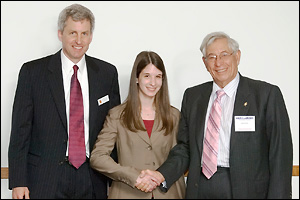Sweet Named 2009 Fischell Fellow
Graduate Program in Bioengineering student Deborah Sweet (B.S. '06, chemical engineering) has been named the 2009 recipient of the Fischell Fellowship in Biomedical Engineering. The announcement was made April 21 at the third annual Fischell Festival by Fischell Department of Bioengineering Professor and Chair William Bentley and department benefactor and medical device inventor Dr. Robert E. Fischell.
The fellowship is a unique opportunity for talented and innovative graduate students interested in applied research and product design in the biomedical industry. It features a $35,000 12-month stipend, full tuition waiver and full health benefits, and is renewable for up to five years.
Sweet is co-advised by Graduate Program in Bioengineering affiliate faculty members Professor Hamid Ghandehari (Department of Bioengineering, University of Utah) and Professor Peter Swaan (Department of Pharmaceutical Sciences and Center for Nanomedicine & Cellular Delivery, University of Maryland School of Pharmacy).
Sweet's winning proposal, "Anionic PAMAM Dendrimers for Oral Delivery of 5-Fluorouracil," describes how her proposed startup company, DendriPharm Systems, would develop an oral drug delivery system for chemotherapy drugs that are traditionally administered intravenously.
Dendrimers—nano-sized, highly branched polymers with defined, controllable structures—will serve as the drugs' base carrier. A dendrimer in a "starburst" configuration provides a large number of terminal groups, like a dense group of twigs at the end of a branch, to which not only therapeutics but also targeting and imaging agents can be attached. Dendrimers are capable of crossing biological barriers in the digestive tract and heading out into the rest of the body, taking their chemotherapy cargo with them. Many chemotherapy drugs are incapable of crossing these barriers on their own, which is why they must be delivered intravenously.
The advantage of using dendrimers as oral drug carriers, Sweet explains, benefits both the patient and the hospital. "A cancer patient could take pills to treat their cancer rather than sit for hours in the hospital receiving intravenous treatments," she says. "The regimen could be more flexible and even include at-home administration. This dramatically reduces treatment costs and lost time at work, and dramatically improves the quality of life for the patient."
Learn more about the Fellowship and current and past Fellows »
Related Articles: April 24, 2009 Prev Next |


